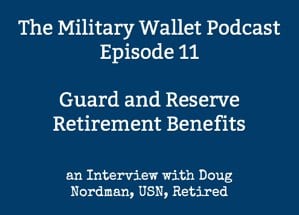Table of Contents
- How to Qualify for Retirement from the Guard or Reserves
- The Importance of Reaching Age 60
- Earning Retirement Points
- Military Retirement Pension Plan Types
- Military Pensions are from Your Base Pay Only
- Calculating a National Guard or Reserve Pension
- Your Guard and Reserve Pay Base Continues to Grow After Retirement
- COLA Adjustments
- Guard and Reserve Health Care in Retirement
- Retiree health care options – under age 60
- Retiree health care options – age 60-65
- Retiree health care options – age 65+
- Which health care plan is the best?
- Dental insurance options:
- Other Retirement Benefits
- Benefits for Spouses & Dependents
Today’s article and podcast both cover National Guard and Reserve retirement benefits. Retiring from the Guard or Reserves has some similarities to an active duty retirement, but there are some very important differences, including when you will receive your military pension, how much you will receive, when you will receive health care coverage under TRICARE, and a few other important differences.

The podcast and this guide both feature excellent information for current members of the National Guard or Reserves, Gray Area Retirees (members of the Guard or Reserves who have reached retirement, but haven’t reached age 60), and active duty servicemembers who aren’t sure if they will remain on active duty through a full retirement. Military retirements can be complicated, so you might even learn something if you already a retired Reservist or Guard member!
Note: If you haven’t considered joining the Guard or Reserves, we have a previous podcast that discusses Joining the Guard or Reserves. There is a lot of great information in both that podcast and article and this podcast and article.
In our interview, and in this guide, you will learn more about:
- How to qualify for retirement from the Guard or Reserves
- Why age 60 is an important birthday for Guard and Reserve retirees
- Earning Retirement Points
- Military retirement pension plans – 3 Types
- How to calculate a Guard or Reserve pension
- How your Guard or Reserve pay base can grow, even after you retire
- The power of Cost of Living Adjustments (this is much more valuable than you think!)
- Health care options through TRICARE
- Base access, shopping, & activities
- and other valuable retirement benefits.
Featured Guest – Doug Nordman

Our guest for this episode is Doug Nordman, military retiree and author of The Military Guide to Financial Independence and Retirement. This book had a large impact on me and helped push me toward joining the Air National Guard after an 8-year break in service. Doug also runs a blog called The Military Guide where he writes about a variety of topics related to military benefits, veterans topics, retirement, and personal finance.
Doug retired from active duty, but his wife retired from the Reserves, giving Doug a good overview of how retirement works from both active duty, and the Guard and Reserves. He offers tips on how to maximize those benefits.
About this guide: The following article covers many of the facts in the podcast, but due to space constraints, leaves out some of the personal anecdotes, specific examples, and additional information. I recommend listening to the podcast if you have the time, and bookmarking this as a resource for future reference.
Military Guide to Financial Independence
This book provides servicemembers, veterans, and their families with a critical roadmap for becoming financially independent. Topics include:
- Military pension
- TSP
- Tricare Health System
- More
How to Qualify for Retirement from the Guard or Reserves
In general, you need to serve 20 years to be eligible for military retirement benefits. This is true for those who serve on active duty, or in the National Guard or Reserves. Members of the Guard and Reserves need 20 “Good” years, or “Satisfactory” years to qualify for military retirement. A Good Year is defined as earning 50 or more points in a year. We will cover earning points in just a moment.
Exceptions to the 20-year rule: There are some situations when you may be eligible to retire a little early. One example is the Temporary Early Retirement Authority, or TERA, which is often used during periods of Force Shaping and Reductions in Force (RIF). Under TERA, some servicemembers are eligible to retire with as few as 15 years of active duty service. However, they also receive a smaller pension, both based on years served, and because there is a multiplier used that decreases the final pension calculation. Other exceptions for early retirement can be made for medical reasons, or under some other limitations. But in general, we are working with the assumption that it takes 20 or more years of service to be eligible for military retirement.
The Importance of Reaching Age 60
Turning 60 is an important birthday for Guard and Reserve retirees. This is the age when Reserve Component retirees become eligible for all military retirement benefits, including pay and health care. Prior to age 60, retired Guard and Reserve members are only eligible for certain retirement benefits, including base access, shopping at the Commissary and Exchanges, and certain other benefits. These retirees are often referred to as “Gray Area” Retirees. You will hear this term often.
Here are some important age-based notes for National Guard and Reserve retirees:
- Gray Area Retirees – Under Age 60. Retired members of the Guard or Reserves who are not yet eligible for full military retirement benefits, most notably the pension and health care benefits.
- Full retirement benefits – Age 60+. Once you reach age 60, you are eligible for all retirement benefits. This includes military pension and health care benefits.
- Early Guard or Reserve Retirement Pay. Some members of the Guard or Reserves are eligible to receive their retirement pay earlier than age 60. However, they still have to wait until age 60 to begin receiving health care benefits through TRICARE Prime (see below for more information about health care in retirement).
- Early Retirement Eligibility. Early retirement pay can be earned by serving at least 90 days on active duty during a fiscal year after January 28, 2008. You can receive your retirement pay 90 days early for each qualifying 90-day activation (but no earlier than age 55). Here is an article that explains early retirement benefits in more detail.
Earning Retirement Points
As mentioned in the previous section, members of the Reserve Component need 50 Points in a year to earn a Good Year toward retirement.
Members of the Guard and Reserves earn 15 participation points each year and they earn points for serving: 1 Point per Drill Period, and 1 Point for each day on active duty. Each Drill Weekend actually has 4 Drill Periods. Guard and Reserve members have a morning drill, and an afternoon drill, each 4 hours long. So a typical Drill Weekend is worth 4 Points toward retirement.
Points can also be earned through AT days (two weeks required annual training), being called to active duty for training, being mobilized, deploying, serving in the Honor Guard for military funerals, and by completing correspondence courses. Not all activities that earn Retirement Points also earn pay at the time you earn the points. For example, completing correspondence courses might be required to progress in your career and they earn you points toward retirement, but you may or may not be paid for completing the course. However, doing so is in the best interest of your career.
In any given year, a member of the Guard or Reserves can expect to earn around 75 points or more, depending on Drill participation, annual training participation, whether you were activated, and other factors. While there is no such thing as a “normal year” in the Guard or Reserves, a “base” year might look something like this:
- 15 Points – Annual Participation
- 48 Points – 12 Monthly Drills (4 Drill Periods per month)
- 15 Points – Annual Training (this can vary based on your unit)
- Additional Points as earned (training, correspondence courses, Honor Guard, mobilizations, etc.).
All your points are maintained by your parent service and work toward calculating your retirement pension. We will cover this in a moment. First, let’s look at how types of military pension plans and other factors used in your retirement calculations.

Check your VA Home Loan eligibility and get personalized rates. Answer a few questions and we'll connect you with a trusted VA lender to answer any questions you have about the VA loan program.
Military Retirement Pension Plan Types
National Guard and Reserve retirement pay are almost always referred to as “Reserve Retirement Pay” regardless of whether you served in the Guard or Reserves. It is also sometimes referred to as “Non-Regular Retirement Pay. That said, the Reserves use the same retirement plans as active duty servicemembers. The only difference is how the pay is computed. Let’s look through the different types of retirement plans, then discuss how to calculate a Guard or Reserve pension.
There are 3 Main Types of Military Retirement Pay Plans:
- Final Pay / High Pay – for servicemembers who entered the military before Sep. 8, 1980. Final Pay uses your last pay grade to calculate your retirement pension.
- High 3 – for servicemembers who entered the military after Sep. 8, 1980. High 3 pay takes the average of your highest three years of base pay.
- REDUX – an elective retirement option for servicemembers who entered the military after Sep. 8, 1980. REDUX offers servicemembers a $30,000 Career Status Bonus at year 15, in exchange for a lower retirement multiple and lower COLA.
We focus almost exclusively on the High 3 Retirement Plan in the podcast because most current servicemembers and recent retirees are eligible for this plan. REDUX is not discussed other than to say not to take it (REDUX is almost never a good idea).
Military Pensions are from Your Base Pay Only
Military pensions are calculated only from your base pay. This is important to know, because military paychecks often include benefits such as BAH and BAS, and may include other incentive or bonus pay such as flight pay, sea pay, danger pay, or other special duty pays or benefits.
This can cause some sticker shock for many active duty members when they first enter retirement because their pension checks are often much smaller than they anticipated. The sticker shock may not be as large for members of the Guard or Reserves, because they are used to seeing Drill Paychecks, which don’t usually include these other benefits at the full monthly rate, and it can often be years, or even decades before the members begin receiving their pension payments.
Calculating a National Guard or Reserve Pension
Guard and Reserve pensions are calculated slightly differently than active duty pensions. Active duty pensions are calculated by multiplying the total years of service by a multiplier of 2.5% (High-3 plan). Then you multiply that by your pay base. In the High-3 pension plan, your pay base is the average of your highest 3 years of pay (rough rule of thumb – that will equal about 95% of your final pay).
Guard and Reserve pensions are calculated in a similar manner, but there is an intermediate step that must be completed before you can calculate the final pension. We must first convert Points into years served. To do this, add up all your Points, then divide by 360. This gives you the total number of years served (the military calculates a month as 30 days to make the math easy; so each year served is 12 months at 30 days each, for a total of 360 days).
So take your total number of days served, and divide by 360, then multiply that by 2.5%. Here is a quick example: Say you have 3,150 points. Divide that by 360, then multiply by 2.5%. You get (3,150/360) * 2.5% = 21.875%. Now multiply that by your pay base (average of your high 3 years of salary).
Get a More Precise Estimate of Your Pension: Every service has an online retirement calculator that allows you to put in very granular information, including your Date of Initial Entry Into Military Service (DIEMS), your estimated retirement date, and other factors. It’s important to note that these calculators are often password protected and you need to login to your branch website get this information.
Your Guard and Reserve Pay Base Continues to Grow After Retirement
There is a little-known fact about National Guard and Reserve retirement pay. Depending on how you retire from the Guard or Reserves, you can continue earning time in grade and longevity toward retirement. That means the value of your retirement can keep pace with military pay raises and inflation while you await retirement pay. But only if you choose to retire under the right classification.
Congress gives you the option of retiring awaiting pay or resigning from the military.
Retired Awaiting Pay:
Retiring Awaiting Pay is the better option from a financial perspective, but it comes with a (slight) risk. Technically, you are still eligible to be recalled to active duty in the even of a full mobilization. However, it would take a full mobilization of the entire military for you to be recalled from retirement. This is extremely rare and didn’t even happen post-9/11.
Here is the payoff – while you are retired awaiting pay, your clock is still running on your longevity and time in service. So if you retire awaiting pay as an E-7 at 20 years, your clock keeps running to the maximum for that rank, which is 26 years of service. So you get pay increases for 6 more years in service, just for being on call. To top it off, you will receive the pay scale in effect when you turn 60, not the pay scale when you retire. So your pay has the potential to increase substantially while you wait to turn age 60.
Resigning from the Guard or Reserves:
This has no risk of being recalled, however, resigning from the military will lock in your retirement check with the years of service and the pay scale in effect the year you retired. This can have a hugely negative impact on your pension, especially if you have a couple of decades to wait before turning age 60!
Retired Awaiting Pay is the Way to Go! Retired members of the Reserve Corps haven’t been involuntarily recalled to active duty since WWII. Yes, it is possible to be recalled, but the odds are very small. And the financial gains can be huge.
COLA Adjustments
Your military pension is indexed for inflation through annual Cost of Living Adjustments (COLA). Military pensions are tied to an annual COLA based on the Consumer Price Index, or the average cost of inflation over a variety of consumer goods. This varies from year to year. In some years there is no COLA increase to retirement pay, and in other years it could 1%, 2%, or even higher.
Many people underestimate the value of these pay raises. While 1% or 2% seems like a small pay increase, these are cumulative, and they add up quickly. For example, Doug shared that his military pension has increased by 27% over the last 12 years, just from COLA increases. 27% is huge!
It’s important to understand that while your pension will increase over time, it should be enough to roughly keep pace with inflation. So while the dollar amount is a lot larger, the purchasing power should be similar as when you retired. However, this is an incredibly powerful benefit, because most civilian pensions plans aren’t indexed to inflation.
Guard and Reserve Health Care in Retirement

Members of the Guard and Reserves have different health care options than active duty servicemembers and active duty retirees. While still serving in the National Guard and Reserves, members are eligible for TRICARE Reserve Select (TRS), which is a premium-based health insurance program. Its cost is very affordable, coming in at roughly $50/mo for a member, or around $205/mo for a family plan. However, you lose TRS eligibility when you retire or otherwise leave the Guard or Reserves.
Your healthcare options in retirement depend upon your age (Gray Area Retirees are not eligible for TRICARE Prime or Standard), where you live, and other factors. Here are the basics (and we have a full-length article listed at the end of this section which gives much more information).
Retiree health care options – under age 60
Gray Area Retirees are eligible for TRICARE Retired Reserve (TRR), which is similar to TRICARE Reserve Select, without any subsidies. The retiree must pay 100% of the premiums if they wish to participate in the plan. TRR premiums are roughly $361/mo for the individual and about $961/mo for a family plan. Other healthcare options include employer-sponsored health care plans, or an individual health care plan, such as those you might find on the health insurance exchanges. eHealthInsurance.com has a lot of great options.
Retiree health care options – age 60-65
Guard and Reserve retirees become eligible for TRICARE Prime at age 60. This is the same health insurance plan open to active duty military members and retirees. However, retirees are only eligible for TRICARE Prime if they live within a certain distance of a military installation or regional health care center. If the retiree lives out of the area, they would only be eligible to receive TRICARE Standard.
Retiree health care options – age 65+
At age 65, Reserve Corps retirees are eligible to receive TRICARE for Life, which is a Medicare Supplemental Insurance Program. There are no monthly premiums for this plan.
Which health care plan is the best?
This is where it’s a good idea to listen to the podcast episode. Doug goes into each of these plans in more detail and explains the associated pros and cons of each plan. Additionally, you can contact a TRICARE Ombudsman who can help you decide which plan is best for your situation. There should be one at each Military Treatment Facility, or you can contact TRICARE, and they will have someone explain things to you and help you choose. Finally, we have full-length articles discussing health care options after leaving the military and Retired Guard and Reserve health care options.
Dental insurance options:
Until age 60, retired Guard and Reserve members must provide their own dental coverage. They can do this through their civilian employer, by purchasing a private insurance plan, or by self-insuring for dental care. Members become eligible for military retiree dental coverage at age 60.
Additional Health Care Info Covered in the Podcast:
- Healthcare for dependents
- What if you don’t live near a Military Health Care Facility?
Other Retirement Benefits
Doug and I discuss other military retiree benefits, including access to base facilities such as the:
- Commissary
- Base Exchanges
- Gyms
- Hobby activities where available, such as the Auto Hobby Shop, Woodworking Shop, MWR facilities, movie theater, etc.
These base activities can be a great way to save money, participate in hobbies, and continue to be a part of the military community.
Military Hops – Space-A Travel: Military hops and Space-A travel are another topic we discussed. These can be a great way to see the world on the cheap.
Basically, flying Space-A allows you to fly on military transport if there are available seats. You pay a nominal fee (usually only a few dollars). You can often find trips going all over the world, and many of the flights go out on a regular basis. There are some downsides, however. Because you are flying on a space-available basis, you may not be able to get the flight on the day or time you want. Flexibility is the key if you use Space-A travel!
There are a few differences for Space-A availability for Guard and Reserve retirees. The member is eligible to fly Space-A if they are a Gray Area retiree, but their dependents may not be eligible until the servicemember reaches age 60, which is when their retirement is on par with an active duty retirement.
Benefits for Spouses & Dependents
Benefits for your dependents, including your spouse and children, are similar going to be similar to when you were on active duty, with the exception of your health care which will depend upon your specific situation (whether you are eligible to use TRICARE Prime, or are required to use Standard). Spouses and Dependents still maintain base access and access to the Commissary, Exchanges, MWR facilities, and other base activities.
Did we miss anything? Military retirement is a huge topic, and we tried to cover as much as we could in the 40 minutes or so that we talked. I also did my best to get the main points down on paper for those who prefer to read. Please leave a note in the comments if we missed anything and we’ll address it. Thanks!




Comments:
About the comments on this site:
These responses are not provided or commissioned by the bank advertiser. Responses have not been reviewed, approved or otherwise endorsed by the bank advertiser. It is not the bank advertiser’s responsibility to ensure all posts and/or questions are answered.
Spencer says
It’s a 2% multiplier joining after 2018, right?
Ryan Guina says
Spencer, yes, the Blended Retirement System (BRS) features a 2% multiplier and offers a Career Status Bonus and matching TSP contributions. It started on January 1, 2018, though military members who were serving prior to that date had the option to opt-into the BRS. So some members who joined before 2018 may also have a 2% multiplier.
Joel Chapman says
Hey Ryan, what is going on with age 60 retirement pay processing at Fort Knox. The have had my packet for a year now and I turned 60 one month ago.
Ryan Guina says
Joel, I don’t have a good answer for you other than to contact the Army Human Resources Center directly to inquire about your retirement package. Best wishes!
Anthony Long says
I was looking for current information on combat deployments impact if any would have on my eligibility for retirement pay. It has always been at age 60, however when I was deployed to Iraq there was lots of conversation about a program that would deduct the years served in combat zones from the age 60 requirement and in my case possibly begin drawing retirement pay at age 58. Do you have any information you could share with respect to this ????
Ryan Guina says
Anthony, Yes there is legislation that allows Guard and Reserve members to claim earlier retirement when they are activated under certain types of orders. You can learn more in this article about early Guard and reserve retirement age.
From the article, early retirement “only applies to members of the Guard or Reserves who participated in a qualifying active-duty mobilization after Jan. 28, 2008, which is the date the Act was signed into law. Service on or before this date does not count toward early retirement.”
Best wishes!
Alan Berens says
Hi, great information but my situation was I was Medically retired will I still earn credit from the time of discharge until I collect retirement? Thanks!